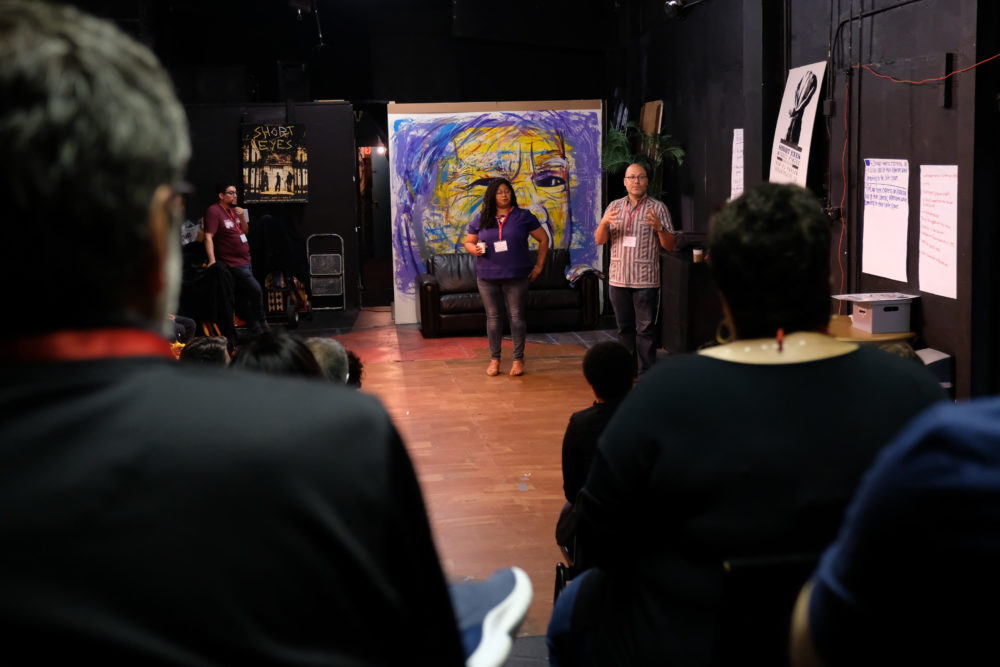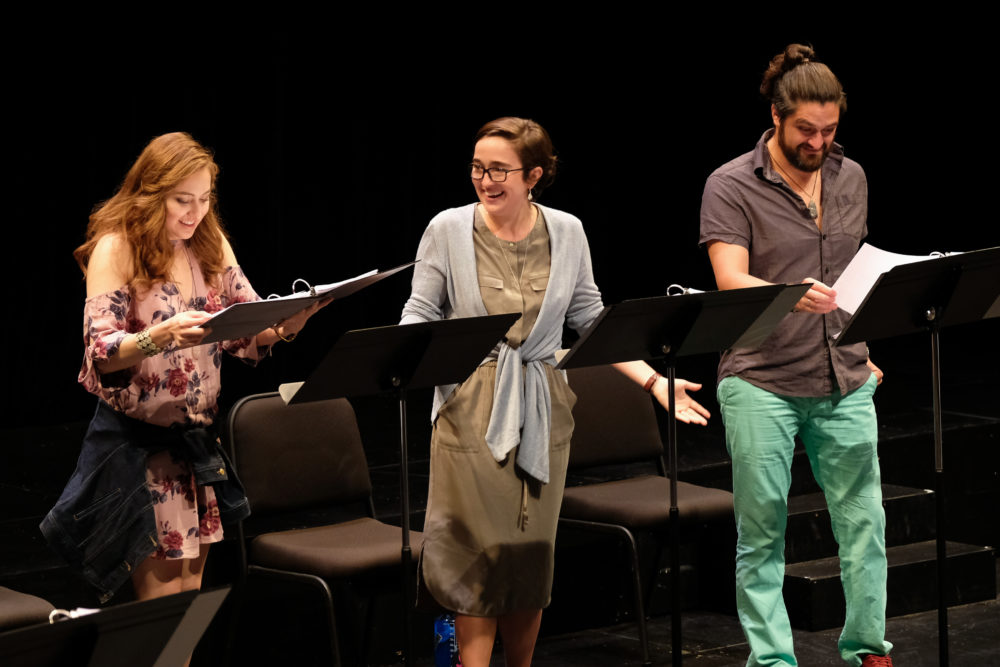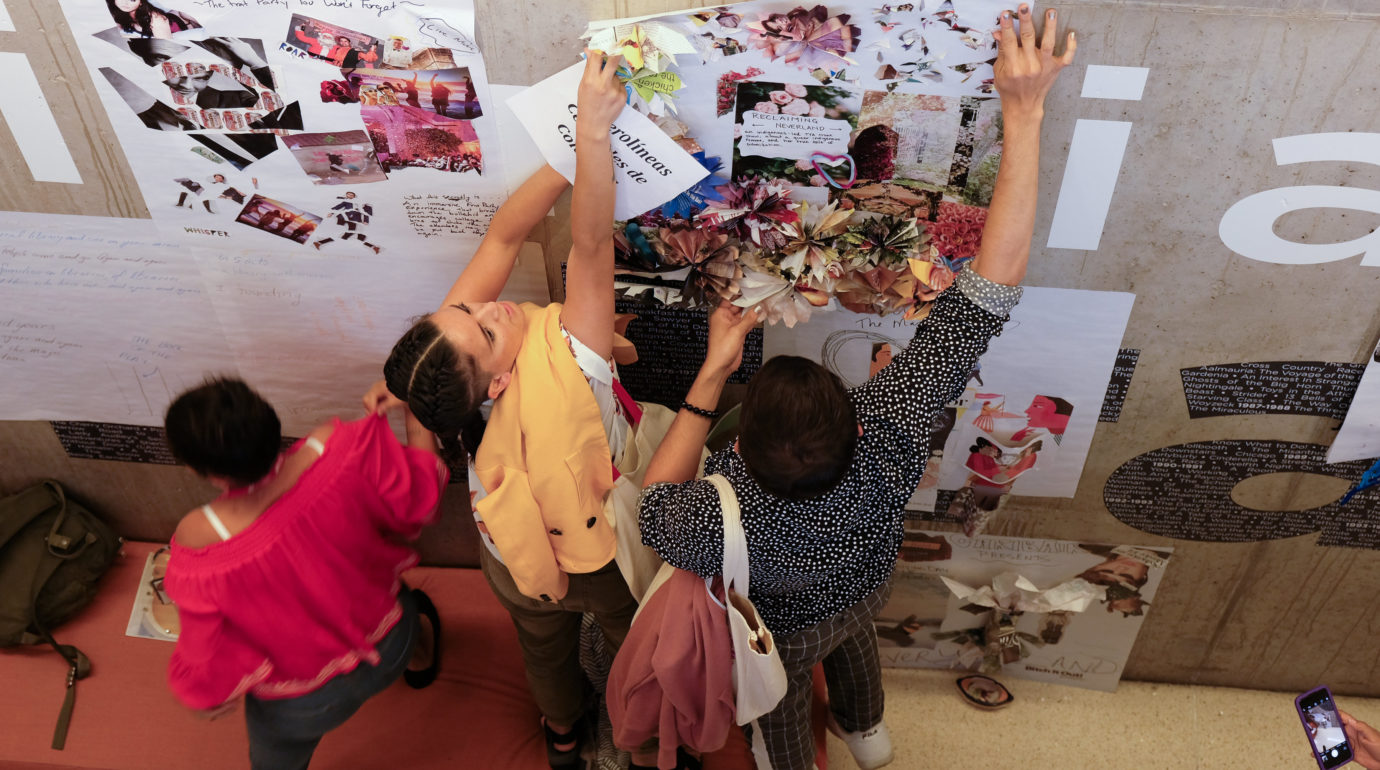The authors of this piece were invited to the Latinx Theatre Commons 2018 Carnaval of New Latinx Work, which took place in Chicago, July 19-21. Lucas Garcia served as a dramaturg for one of the plays, and was part of the Alliance of Latinx Theatre Artists of Chicago (ALTA) host committee that helped produce the three-day event, while Regina Victor was a happy spectator and invited guest, participating in the festival with the other artists from Chicago and around the country. After attending, Regina and Lucas had a conversation about their shared experiences to give you a holistic look into this incredible event.
First a bit of background: The Latinx Theatre Commons is a coalition of artists dedicated to increasing the visibility of Latinx artists and stories in the American theatre. Besides publishing a journal on Latinx theatre and providing production resources for plays, the LTC also hosts a festival called Carnaval. This year’s Carnaval of New Latinx Work, its first such gathering since 2015, was hosted by the Theatre School at DePaul University in association with Teatro Vista and the Alliance of Latinx Theatre Artists of Chicago. More than 200 artists were in attendance over a long weekend for networking, artistic celebration, and to attend the readings of six new plays by Latinx playwrights.
KEY TAKEAWAYS
Lucas Garcia: Each play was developed with a Latinx creative team, including a director, dramaturg, actors, and designers. The teams had about 14 hours to rehearse the play. I was the dramaturg on Paz Pardo’s play Milton, MI, about an award-winning poet who must face down her own writer’s block as well as the dissolution of her long-term relationship, all while dealing with a plague of slugs. I worked with director Diane Rodriguez and an incredible team of designers and actors to present a developmental reading of Paz’s play.
I’m thankful that I was in an intergenerational room featuring strong femme artists, and the wealth of experiences that Diane, Paz, and I brought to the script and the process pushed our discussions to some really exciting places. The short rehearsal process was challenging at times, and there are always moments of confusion in a process where a few dedicated people are coordinating upwards of 30 artists from all over. Ultimately the pressurized nature of the process brought out a successful collaboration, and perhaps more importantly, it was fun! The pressure of time without the constraints of budget or programming concerns created an atmosphere of play and resulted in some really exciting designs and discussions.
Regina Victor: The part of the process that I got to witness was what was presented at the end of each reading. Each piece was followed by a talkback with the dramaturg and the playwright, then a series of design presentations. When I was first told we’d be presented with a directorial and design vision for the piece, I thought it was cool but that it would limit my take on the piece if I ever wanted to direct it myself (in addition to being a theatre critic, I am also a director/dramaturg). This could not have been more false. Chatting afterward with some of the teams, you learned they only had a few hours to really put together their vision, and so I think these broad brush strokes of statements actually left more to the creative imagination. I had an entire treatment for Alexis Scheer’s Our Dear Dead Drug Lord (one of the highlights of the festival for me) in my head before I left the building.
The Carnaval took advantage of the opportunity to introduce the national theatre community to not just playwrights, but exemplary Latinx designers, actors, directors, and dramaturgs.

Garcia: Another highlight of the conference for me was the site visit to Urban Theater Company, one of four field trips attendees could take to local Latinx companies. I appreciated the balance that was struck at Carnaval between showcasing invited artists, many of whom were not based in Chicago, and the local theatre ecosystem. Attendees were able to learn about and witness the work being done in these local communities (many of which are facing rapid and unrelenting gentrification), work that is pushing the boundaries of what theatre is and can be, and more importantly who it can be for.
Victor: I thought it was incredibly inspiring that the Latinx Theatre Commons created a program that would allow the artists in Chicago to be highlighted, and I hope it changes the way we organize all of our national conferences. I also went to to Urban Theater Company, where they are creating housing options for artists and inviting merchants that fit the vision of the company to come and be a part of their village. There is a lot of beautiful Latinx theatremaking happening in the city outside of predominantly white institutions, and guests had the opportunity to meet those practitioners.
One of the best things about the three days of Carnaval was there was absolutely no hierarchy. I came into a ConeXion session (sessions devoted to us getting to know other members of the conference), saw some colored markers, and immediately plopped down on my stomach. Within seconds we were all engaged in a group activity, which in this case was taking a popular story such as Three Little Pigs, Fuenteovejuna, etc., and making a Brechtian adaptation.
Trevor Boffone of 50 Playwrights Project, Jose Luis Valenzuela of Latino Theater Company, and I had a spirited discussion about how to best adapt our adaptation of the Three Little Pigs, while an undergraduate student named Aleta dutifully oversaw the process. I was handed a bunch of pigs and wolves made out of pipe cleaners, and we ended up making a pitch called Straw. Wood. Brick about immigration from the ’80s to present, which hung proudly next to another group’s adaptation, called Bay Area of Pigs.
Garcia: There’s always some dissonance when you work in systems and industries that were not designed or built with you in mind, and I did feel some of that during Carnaval. There’s pressure to understand yourself and the work you do through the lens of a racial or class majority, and of course your own location with regard to systems of oppression and power factors into that. There was somewhat of a tonal and aesthetic shift between the showcase at Carnaval and the work that attendees witnessed during the site visits, and to some degree when seeing other shows in Chicago.
Noche Victoria is a prime example for me. ALTA organized and curated the opening night celebration and performances, and the differences between those performances and what folks had seen during the readings at DePaul were impossible to not notice. Work being done by Albany Park Theater Project, FEMelanin, and artist-activists like Jasmin Cardenas and Melissa DuPrey looked and felt different than the featured work at Carnaval. Reconciling those differences was sometimes difficult, and I appreciated that the LTC made an effort to decentralize the idea of a “Latinx aesthetic” by inviting attendees to step outside of the institutional framework of mainstream regional theatre.

CONCLUSION
Garcia: I left Carnaval reinvigorated by the energy of the artists and makers who attended and shared their time and gifts with each other, and by the intentional efforts of the LTC and ALTA to showcase Chicago theatre as well as national talent. It’s vital to create and insist on opportunities for people to see themselves reflected in the work they produce, and the attendees had a chance to glimpse many different ways of doing that.
Victor: Carnaval was an inspirational gathering of Latinx theatre artists. My ultimate takeaway was that I wished we could have something like this for every community. The most rewarding part was the site visits and the showcasing of the local artists. They did a wonderful job pairing the national theatre landscape with Chicago’s incredible art scene, leading to an enriching event that should shape the way we approach conferences in the future.
Lucas Garcia is a Chicago-based writer and dramaturg. They are currently the co-director of marketing and communications for the Alliance of Latinx Theatre Artists of Chicago.
Regina Victor is a Chicago-based producer, dramaturg, director, writer and performer. They are the co-founder of Rescripted, an artist-led online journal for criticism and essays.


